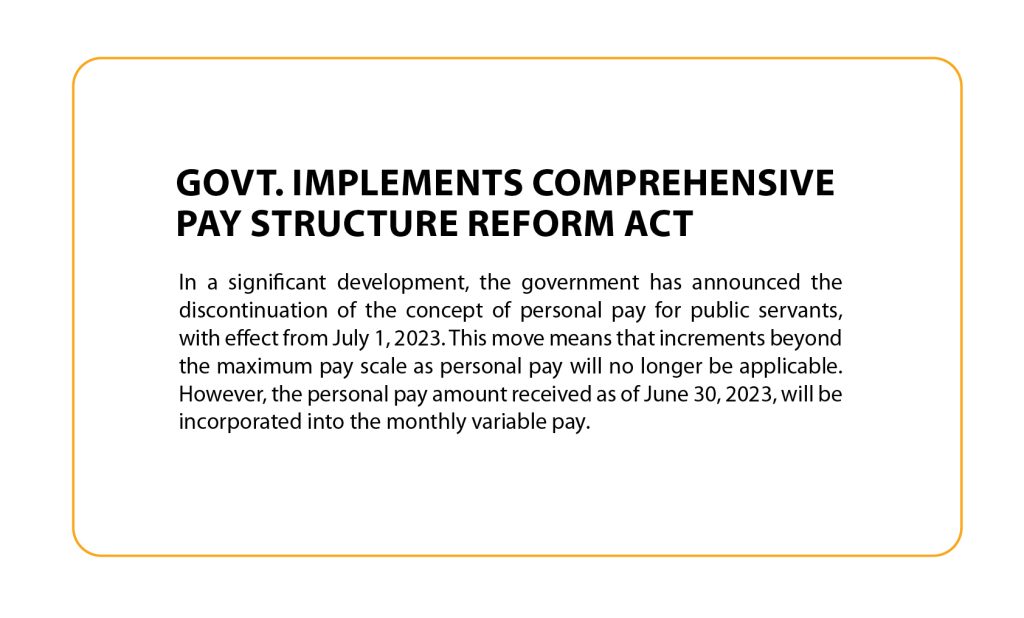Personal pay discontinued for public servants and variable pay system introduced
In a significant development, the government has announced the discontinuation of the concept of personal pay for public servants, with effect from July 1, 2023. This move means that increments beyond the maximum pay scale as personal pay will no longer be applicable. However, the personal pay amount received as of June 30, 2023, will be incorporated into the monthly variable pay.
The decision is part of the ongoing Pay Structure Reform Act of Bhutan, which was implemented in 2022. The reform seeks to bring about comprehensive changes to the pay structure, allowances, and benefits for National Assembly and National Council Members, as well as Civil and Other Public Servants.
Under the revised pay structure, new appointments and reappointments to specific positions will be set at the minimum of the pay scale. Additionally, public servants who join or leave their positions during a month will receive their monthly pay on a pro-rata basis.
In the healthcare sector, the reform addresses the need for fair compensation for critical services. Health professionals attending night duty for 12 hours will receive night duty allowance of Nu.500 per night as recognition for their dedication to continuous patient care.
Radiation allowance of up to Nu.3,000 per month will be provided to practicing X-ray technicians, dentists, radiologists, dental surgeons, and hygienists under the Ministry of Health and X-ray Technicians under the Department of Livestock. However, this allowance will not be extended to those who do not perform dental X-rays or work in areas without dental X-ray facilities.
To support public servants working in remote and challenging areas, the Difficulty Area Allowance will be granted at Nu.2,000 per Dholam per month, with a maximum ceiling of Nu.10,000 per month for difficulty areas.
The reform introduces a new pay structure for Civil and Other Public Servants, separating it into Fixed Pay and Variable Pay components. Fixed Pay will include the Monthly Basic Pay (MBP), used for calculating post-service benefits, and the Non-Pensionable Monthly Pay (NPMP), which includes existing allowances applicable across the board, such as House Rent Allowance (HRA).
Variable Pay, on the other hand, will consist of the Monthly Variable Compensation (MVC), incorporating all allowances and cash equivalents, and the Performance-Based Incentive (PBI), which may be implemented at a later stage.
As part of the pay revision, all public servants will receive a one-off 5% indexation based on the minimum pay scale, along with an additional lump sum payment equivalent to 50% of the minimum pay scale, effective from July 1, 2023. This revision will apply to all public servants whose salary, allowances, benefits, and other emoluments are drawn from the Consolidated Fund.
The reform also affects housing allowances. HRA will no longer apply to public servants provided with designated housing at specific positions, while those occupying government-owned residential housing will pay rent based on the carpet area. Local Government Functionaries will not receive HRA.
Moreover, the Variable Pay system will absorb several allowances, including the lump sum professional allowance for common support services staff, leave encashment, and the Leave Travel Concession. Additionally, specific allowances will be introduced for medical professionals pursuing post-graduate courses at KGUMSB.
The reform extends to Members of Parliament (MP) as well, with allowances for vehicle purchase, driver allowances, and fuel and maintenance allowances. Local Government officials will also receive special responsibility allowances. The vehicle purchase allowance for the MP shall be provided as a lump sum amount of Nu 1mn per term.
The report states that the Pay Structure Reform Act of Bhutan, with its continued implementation, aims to create a fair and competitive pay structure for the country’s public servants. The government seeks to ensure that public servants are adequately compensated for their services, ultimately fostering a motivated and efficient workforce.
Tshering Pelden from Thimphu














